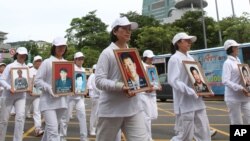BEIJING —
Earlier this year, China announced it would close the country’s labor camps, overturning a law that had been in place for more than 50 years. However rights group Amnesty International alleges that the labor camp system has merely been replaced by other detention centers that continue to wrongfully imprison political and religious dissidents.
Since the announcement, Amnesty International reports that authorities are silencing increasing numbers of petitioners, political dissidents and members of the Falun Gong through black jails and drug rehabilitation centers.
“The individuals who were sent to those camps are being increasingly sent to black jails for instance, undocumented and unofficial detention facilities,” said Roseann Rife, East Asia Research Director for Amnesty International.
China’s Foreign Ministry denies this is happening and questions the veracity of Amnesty International’s reports.
When asked about Amnesty International’s press release, spokesperson Hua Chunying says that the organization has always had a prejudice against China and makes many irresponsible remarks.
China’s re-education through labor law was instituted in 1957, and China said it had 350 labor camps across the country with as many as 160,000 inmates. Last month China vowed to close those camps as part of a series of reforms unveiled at the conclusion of China’s Third Plenum.
However Amnesty International conducted more than 60 interviews with former inmates, their family members and lawyers, and concluded that some labor camps have changed in name only. Researchers say that many camps have turned into compulsory drug rehabilitation centers where drug offenders are forced to do factory work. Amnesty reports it has also documented increasing numbers of people declared insane and detained illegally in China’s mental hospitals.
In recent years detainees described mistreatment at China’s labor camps, including beatings with electric batons, rack torture, denial of food and forced injections with unknown drugs.
Amnesty International's Rife says that torture continues in the extra judicial places of detention.
“Torture is a problem in detention facilities, and we’ve seen a lot of talk about reform and new regulations to try and address it. But unless we start to see the ability for these cases to be heard in court for the perpetrators of the torture and mistreatment to be prosecuted, then its unlikely we’ll see the impact that even the Chinese authorities are trying to accomplish,” she said.
China has not announced what will happen to current labor camp prisoners and what systems will officially replace the re-education through labor system. Rife says this needs to be made clear
“Is there a formal plan for closing these camps and what replaces them? And what exactly is the legal status for the people who have been released or are still in the camps?”asks Rife.
In addition to clarifying details of its plans to close the country’s labor camps, Amnesty International says China should address the underlying problem - persecuting people for exercising their political and religious beliefs and end arbitrary detention entirely.
Since the announcement, Amnesty International reports that authorities are silencing increasing numbers of petitioners, political dissidents and members of the Falun Gong through black jails and drug rehabilitation centers.
“The individuals who were sent to those camps are being increasingly sent to black jails for instance, undocumented and unofficial detention facilities,” said Roseann Rife, East Asia Research Director for Amnesty International.
China’s Foreign Ministry denies this is happening and questions the veracity of Amnesty International’s reports.
When asked about Amnesty International’s press release, spokesperson Hua Chunying says that the organization has always had a prejudice against China and makes many irresponsible remarks.
China’s re-education through labor law was instituted in 1957, and China said it had 350 labor camps across the country with as many as 160,000 inmates. Last month China vowed to close those camps as part of a series of reforms unveiled at the conclusion of China’s Third Plenum.
However Amnesty International conducted more than 60 interviews with former inmates, their family members and lawyers, and concluded that some labor camps have changed in name only. Researchers say that many camps have turned into compulsory drug rehabilitation centers where drug offenders are forced to do factory work. Amnesty reports it has also documented increasing numbers of people declared insane and detained illegally in China’s mental hospitals.
In recent years detainees described mistreatment at China’s labor camps, including beatings with electric batons, rack torture, denial of food and forced injections with unknown drugs.
Amnesty International's Rife says that torture continues in the extra judicial places of detention.
“Torture is a problem in detention facilities, and we’ve seen a lot of talk about reform and new regulations to try and address it. But unless we start to see the ability for these cases to be heard in court for the perpetrators of the torture and mistreatment to be prosecuted, then its unlikely we’ll see the impact that even the Chinese authorities are trying to accomplish,” she said.
China has not announced what will happen to current labor camp prisoners and what systems will officially replace the re-education through labor system. Rife says this needs to be made clear
“Is there a formal plan for closing these camps and what replaces them? And what exactly is the legal status for the people who have been released or are still in the camps?”asks Rife.
In addition to clarifying details of its plans to close the country’s labor camps, Amnesty International says China should address the underlying problem - persecuting people for exercising their political and religious beliefs and end arbitrary detention entirely.




